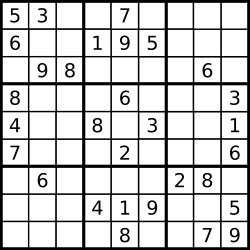Empty cells are indicated by the character
'.'.You may assume that there will be only one unique solution.

A sudoku puzzle...

...and its solution numbers marked in red.
Naive Way: The only way I can solve this kind of problem is DFS, which is n organized brute force solution. However, brute force doesn't not mean a bad method. And how to write this backtrace DFS neatly is really a challenge.
This is the code I first time write it. Even myself don't want to read through it for it is extremely tedious.
This is the code I first time write it. Even myself don't want to read through it for it is extremely tedious.
public class Solution {
public void solveSudoku(char[][] board) {
Stack<Node> stack = new Stack<Node>();
// make a copy of board
char[][] origin = new char[9][9];
Node last = new Node(0,0,'.');
for(int i = 0;i < 9;i++)
for(int j = 0;j < 9;j++)
origin[i][j] = board[i][j];
// push the first empty grid node into stack
boolean find = false;
for(int i = 0;i < 9;i++){
for(int j = 0;j < 9;j++){
if(board[i][j] == '.'){
List<Node> list = validNumber(board,i,j);
for(int t = 0;t < list.size();t++)
stack.push(list.get(t));
find = true;
break;
}
}
if(find)
break;
}
// find the last empty grid node
find = false;
for(int i = 8;i >=0;i--){
for(int j = 8;j >= 0;j--){
if(board[i][j] == '.'){
last = new Node(i,j,'.');
find = true;
break;
}
}
if(find)
break;
}
// DFS
while(!stack.isEmpty()){
Node node = stack.pop();
board[node.x][node.y] = node.val;
if(node.x == last.x && node.y == last.y)
return;
// find the next position
boolean isFound = false;
boolean hasNext = false;
for(int j = node.y+1;j < 9;j++){ // find on current row
if(board[node.x][j]=='.'){
isFound = true;
List<Node> list = validNumber(board,node.x,j);
for(int t = 0;t < list.size();t++)
stack.push(list.get(t));
if(list.size()!=0)
hasNext = true;
break;
}
}
if(!isFound){ // find on next rows
for(int i = node.x+1;i < 9;i++){
for(int j = 0;j < 9;j++){
if(board[i][j]=='.'){
isFound = true;
List<Node> list = validNumber(board,i,j);
for(int t = 0;t < list.size();t++)
stack.push(list.get(t));
if(list.size()!=0)
hasNext = true;
break;
}
}
if(isFound)
break;
}
}
if(!isFound) // should never happen
return;
// if no char can be filled, BACK TRACE
if(!hasNext){
if(stack.isEmpty()){
return;
}else{
Node peek = stack.peek();
if(peek.x==node.x){ // back trace current row
for(int j = node.y;j >= peek.y;j--)
board[node.x][j] = origin[node.x][j];
}else{ // back trace previous row
for(int j = node.y;j >= 0;j--)
board[node.x][j] = origin[node.x][j];
for(int i = node.x-1;i >= peek.x+1;i--)
for(int j = 8;j >= 0;j--)
board[i][j] = origin[i][j];
for(int j = 8;j >= peek.y;j--)
board[peek.x][j] = origin[peek.x][j];
}
}
}
}
return;
}
class Node{
int x;
int y;
char val;
Node(int a,int b, char v){
x = a;
y = b;
val = v;
}
}
private List<Node> validNumber(char[][] board, int x, int y){
List<Node> output = new ArrayList<Node>();
boolean seq[] = new boolean[9];
// its block
int center_x = x/3 * 3 + 1;
int center_y = y/3 * 3 + 1;
for(int i = -1;i <= 1;i++)
for(int j = -1;j <= 1;j++)
if(board[center_x+i][center_y+j]!='.')
seq[(int)(board[center_x+i][center_y+j]-'1')] = true;
// its col and row
for(int i = 0;i < 9;i++)
if(board[i][y]!='.')
seq[(int)(board[i][y]-'1')] = true;
for(int j = 0;j < 9;j++)
if(board[x][j]!='.')
seq[(int)(board[x][j]-'1')] = true;
// construct Nodes
for(int i = 0;i < 9;i++)
if(!seq[i]){
Node node = new Node(x,y,(char)(i+'1'));
output.add(node);
}
return output;
}
}
Below is my current code, which is more readable, (at least I think so).
public class Solution {
boolean found;
public void solveSudoku(char[][] board) {
found = false;
dfs(board, 0, 0);
}
private void dfs(char[][] board, int x, int y){
// position correction
if(x==9){
x = 0;
y++;
}
// base case
if(y==9) {found = true;return;}
// recursion
if(board[x][y]!='.'){
dfs(board, x+1, y);
}else{
List<Integer> list = validNum(board, x, y);
for(int i = 0;i < list.size();i++){
board[x][y] = (char)('0' + list.get(i));
dfs(board, x+1, y);
if(found) return;
board[x][y] = '.';
}
}
}
private List<Integer> validNum(char[][] board, int x, int y){
List<Integer> list = new ArrayList<Integer>();
int center_x = x/3 * 3 + 1;
int center_y = y/3 * 3 + 1;
boolean[] engaged = new boolean[9];
for(int i = -1;i <= 1;i++)
for(int j = -1;j <= 1;j++)
if(board[center_x+i][center_y+j]!='.')
engaged[(int)(board[center_x+i][center_y+j]-'1')] = true;
for(int i = 0;i < 9;i++)
if(board[i][y]!='.') engaged[(int)(board[i][y] - '1')] = true;
for(int j = 0;j < 9;j++)
if(board[x][j]!='.') engaged[(int)(board[x][j] - '1')] = true;
for(int i = 0;i < engaged.length;i++)
if(!engaged[i]) list.add(i+1);
return list;
}
}
No comments:
Post a Comment